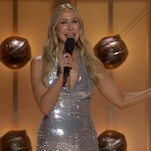Braff has it bad. After leaving L.A. to return to his dead-end New Jersey hometown, he takes to tooling around on his antique motorcycle, finding old friends (including self-aware burnout Peter Sarsgaard), and making new ones, particularly quirky local Natalie Portman. Sarsgaard introduces Braff to a party scene decadent enough to put any Hollywood contacts to shame, while Portman brings him into an eccentric family home filled with hamster tunnels and overeager dogs.
The setup risks preciousness and pretentiousness, and it ultimately succumbs to both. But for a while, Braff—a star of TV's Scrubs, making an assured debut as a writer and director—brings a low-key, atmospheric style to match the fine performances of his cast, including himself. Garden State shares a tone with last year's The Station Agent, another film by an actor-turned-writer/director, and another film whose primary pleasure came from watching its cast members act their hearts out. Garden State coasts on this considerable charm until it hits a brick wall in its final segments. Braff's screenplay is initially a succession of clever exchanges, but it devolves into forced confrontations, symbol-laden big moments, and speeches that feel patched together from Monologues For Young Actors. It's all well and good to have a character rediscover hope in the midst of death, but having him literally howl in defiance at the abyss probably qualifies as excessive.








































